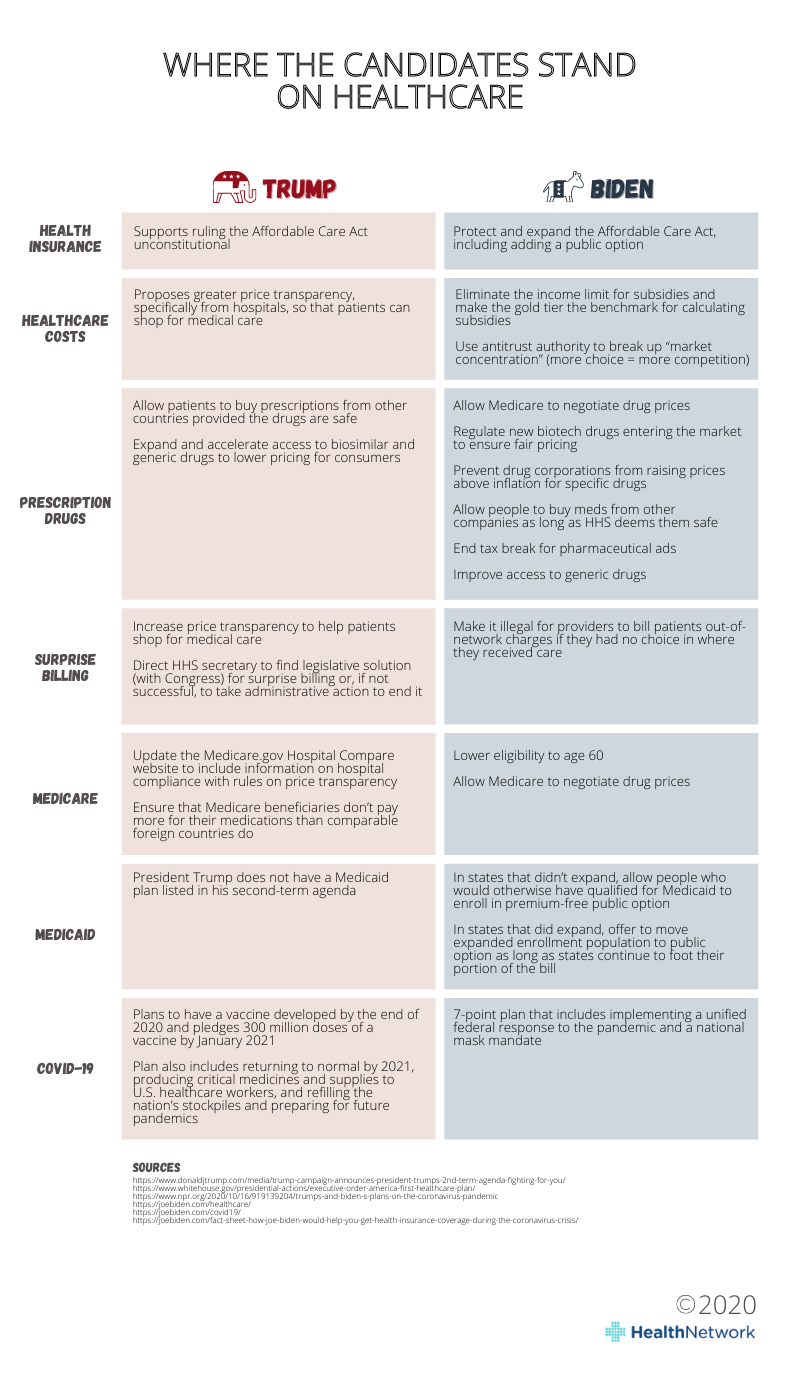It’s been a weird year for healthcare — and that’s putting it mildly. Understandably, the global health crisis took over health headlines in early spring and hasn’t let up.
Other pressing healthcare topics — like prescription drug prices, legal challenges to the Affordable Care Act, surprise medical billing and even the opioid crisis — got bumped in favor of hospitalization counts, death rates and the race for a COVID-19 vaccine.
But healthcare is still a top issue for voters in the 2020 elections.
A Gallup poll conducted in September found that most registered voters (80%) ranked healthcare as “very important” or “extremely important.” Pew Research Center found similar results during a survey in July and August, with 68% of respondents citing healthcare as “very important.”
And it’s not just the coronavirus pandemic that’s causing concern among voters.
A separate study from Gallup conducted in July found that half of American adults now fear that a major medical event could bankrupt them.
That same survey found that households earning less than $40,000 a year were four times likely to have long-term medical debt as households earning $100,000 a year. Even worse, 26% of adults said they’d have to borrow money to cover an unexpected $500 medical bill.
Overall, these stats point to one prevailing theme: the American people are frustrated and concerned when it comes to healthcare.
And with Election Day less than a week away, we thought we’d round up what the major candidates have to say about the subject.
Disclaimer:
HealthNetwork is not taking positions in this article, nor is the company endorsing a candidate or policy position. We’re presenting the following info so that voters know what the major candidates have to say on an issue that’s particularly relevant to us as an independent health insurance marketplace — and to you, as a patient and consumer in the current healthcare system. In short? The following is for informational purposes only.
Here’s what President Trump and former Vice President Biden have to say about healthcare, if elected in 2020.
Health Insurance
Where do the presidential candidates stand on health insurance? There’s been a lot of debate among Democrats and Republicans — and various wings of each party — on what to do about rising costs, inequitable access and the system as a whole.
Here’s how President Trump and Joe Biden plan to address health insurance.
Trump
Without trying to sound biased, we have to admit that President Trump’s outline for his second-term agenda is light on details. But it’s clear from the current administration’s actions that President Trump is not a fan of the Affordable Care Act, which was former President Barack Obama’s signature healthcare law.
In fact, the Supreme Court will soon hear another case against the ACA, this time on whether the law is constitutional given that the Trump administration zeroed out the mandate penalty in 2017.
In terms of his plans to replace the ACA, the president has not elaborated on any details yet. But according to his second-term agenda, he plans to lower health insurance premiums, “cover all pre-existing conditions” and “put patients and doctors back in charge of our healthcare system.”
This tracks with language from an executive order from September 24th asserting that the current administration is all about “restoring choice and control to the American patient.”
It’s worth pointing out that if the Supreme Court rules the ACA unconstitutional, the law’s consumer protections (among other things) will end. That includes coverage for people with pre-existing conditions.
To date, the president has not revealed a detailed healthcare plan to replace the ACA, but he says in his September executive order: “The ACA was flawed from its inception and should be struck down. However, access to health insurance despite underlying health conditions should be maintained, even if the Supreme Court invalidates the unconstitutional, and largely harmful, ACA.”
Biden
According to his campaign website, Joe Biden would “build on the Affordable Care Act by giving Americans more choice, reducing health care costs, and making our health care system less complex to navigate.” He also plans to insure more than 97% of Americans in the process.
Biden’s biggest departure from the ACA is to create a public health option similar to Medicare. This public option would be available to anyone, even people who have access to coverage through work.
He would also eliminate the 400% cap on premium subsidies under Obamacare. Right now, anyone earning between 100% and 400% of the federal poverty level can get a tax credit to lower monthly premiums on the marketplace. Biden wants to eliminate that cap and expand access to subsidies for higher-income families.
And speaking of tax credits, Biden would also set the benchmark at the gold tier instead of the silver tier (where it currently sits). This would, according to him, give people more generous benefits while ensuring that more people could access bigger tax credits to buy insurance.
Healthcare Costs
Despite the successes of the Affordable Care Act, healthcare costs remain high, unaffordably high for many Americans. A single unexpected trip to the hospital could cost a couple hundred dollars for one person or a down payment on a house for another, regardless of their insurance status.
Here’s what President Trump and Joe Biden plan to do about healthcare costs.
Trump
President Trump has consistently commented on the high prices of health insurance (and healthcare costs) under the Affordable Care Act. His second-term agenda proposes to end surprise billing, cut prescription drug prices and “protect Social Security and Medicare.”
As of the time of this writing, there’s no plan for how he would accomplish these goals.
But we should point out that Trump has taken executive action towards price transparency in the healthcare industry. And according to the Society for Human Resource Management, he’s pledging to continue those efforts with his second term.
Biden
Joe Biden plans to make health insurance more affordable by introducing a public option. This public option would be able to negotiate rates, like Medicare, and may allow more people to get health insurance. Subsidies would also be more generous under his plan.
As for actual healthcare costs, the Biden campaign hasn’t released details on lowering the cost of medical care other than some commentary on the healthcare market itself. According to Biden, health insurance corporations don’t have enough competition in some places. He would use his antitrust authority to break up “market concentration.”
Prescription Drugs
At one time, lowering prescription drug costs looked promising as a bipartisan effort. But like much of politics these days, that seems increasingly less likely. Nevertheless, high drug prices remains one of the top concerns among the public. And with Medicare spending over $100 billion a year on prescription drugs, it’s an issue that the government should consider carefully.
Here’s what President Trump and Joe Biden have to say about prescription drugs.
Trump
President Trump signed two executive orders on drug pricing this year, the latest of which repealed the first and proposes to lower costs specifically under Medicare.
In his executive order from September 24th, the president orders the Secretary of Health and Human Services (HHS) to coordinate with the Commissioner of Food and Drugs to “maintain and build upon existing actions to expand access to affordable medicines, including accelerating the approvals of new generic and biosimilar drugs and facilitating the safe importation of affordable prescription drugs from abroad.”
On this point, he and Joe Biden agree. Both candidates want to allow importation of drugs from outside the country as long as the medications are safe.
Biden
Biden plans to lower prescription drug costs by allowing Medicare to negotiate lower prices (which it can’t do right now) and regulating specific types of new drugs that enter the market. Specifically, he wants to ensure that the cost of biotech drugs, brand name medicines and “abusively priced generics” doesn’t rise more than inflation.
He also wants to create an independent review board for new medications, especially biotech drugs that won’t have much (if any) competition when they first hit the market. This review board would set a fair price for the drugs, ideally making them accessible to anyone who needed them. Biden also “supports numerous proposals to accelerate the development of safe generics.”
Also, under Biden’s prescription drug proposals, consumers would be able to buy prescriptions from other countries as long as the Department of Health and Human Services deemed them safe.
And to rein in pharmaceutical spending and ads, Biden would eliminate the tax deductions for pharmaceutical ad spend.
Surprise Billing
Have you ever been to the hospital, gotten care, gone back home, then weeks later opened up a bill with a shocking number of digits even though you could’ve sworn you were in network? That’s surprise billing.
It’s a practice that happens when patients think they’re in their health plan’s network but it turns out, they weren’t. Or they were, but there was an unexpected provider in the room — like a surgeon’s assistant — who wasn’t in network even though the hospital was.
It’s confusing and unfair, and just about everyone agrees on that point. They just haven’t agreed enough to do anything about it at the federal level.
Here’s how President Trump and Joe Biden would address surprise billing.
Trump
Per his executive order issued on September 24th, President Trump is working towards ending surprise billing by making medical costs more transparent.
From the order: “Beginning January 1, 2021, hospitals will be required to publish their real price for every service, and publicly display in a consumer-friendly, easy-to-understand format the prices of at least 300 different common services that are able to be shopped for in advance.”
The president has also shown support for bipartisan efforts to end surprise billing in the past.
Presumably, Trump hopes to end surprise billing by making sure that people can adequately (and correctly) shop for healthcare prices ahead of time. His executive order from September orders the HHS secretary to work with Congress on legislation that ends surprise billing by December 31, 2020.
Failing that, Trump has authorized the HHS secretary to take administrative action “to prevent a patient from receiving a bill for out-of-pocket expenses that the patient could not have reasonably foreseen.”
Biden
Joe Biden’s plans to end surprise billing by preventing providers from charging out-of-network prices when a patient doesn’t have a choice about how he receives care (example: hospitalization).
There aren’t any other details about this plan — how it would be implemented, for example — on the campaign website.
Medicare
Created in 1965, Medicare is a federal program that offers low-cost health insurance to older Americans and younger people with certain disabilities. Now covering over 60 million people, Medicare is a popular entitlement program that’s quickly running out of money, at least for a portion of it.
Because it’s popular and valuable to the nation’s seniors — especially in retirement, when there aren’t any comparable benefits available to the 65+ crowd — the issue of how to keep it going remains a sticking point for politicians (from all sides of the aisle).
Here’s what President Trump and Joe Biden have to say about Medicare.
Trump
Earlier this year, President Trump made telemedicine more accessible to seniors through an executive order involving the Medicare program. His “America-First Healthcare Plan” (the aforementioned executive order from September 24th) promises to make many of those temporary changes permanent.
Trump has taken steps in the past to lower drug prices for seniors. And in the America-First Healthcare Plan, the president promises that his administration will continue to “ensure that Medicare patients receive the lowest price that drug companies offer comparable foreign nations through Executive Order 13948 of September 13, 2020.”
Trump also ordered the HHS secretary to “update the Medicare.gov Hospital Compare website to inform beneficiaries of hospital billing quality” within 180 days of the executive order issued on September 24th. These updates would, among other things, allow seniors to see which hospitals are complying with the price transparency rules.
As for the Medicare program in general, the president does not list specifics in his second-term agenda.
Biden
Joe Biden would lower the Medicare eligibility age to 60. It’s currently 65. His campaign website says that he would “protect Medicare as we know it” and “keep Medicare as a separate and distinct program, and ensure there is no disruption to the current Medicare system.”
Beyond that, he hasn’t addressed specifics of his plans for the Medicare program, though he does have plans for older Americans in general.
Medicaid
Medicaid is a joint federal-state program that provides low-cost (or free) health insurance to people who meet eligibility requirements where they live. It was created the same year as Medicare, the program for older Americans. Medicaid covers 1 out of every 5 Americans, and children make up about 43% of enrollees.
Because Medicaid’s payment rates for providers are relatively low, per-enrollee spending in the program is also low compared with private insurance. Still, there’s ongoing debate about the Medicaid program: how to keep funding it, who should be eligible and whether there need to be work requirements.
Here are President Trump’s and Joe Biden’s plans for Medicaid.
Trump
Under the Affordable Care Act, states could expand their Medicaid programs to cover more people. As of October 2020, most states have expanded Medicaid, with only 12 states opting out of expansion.
President Trump does not list Medicaid in his second-term agenda bullet points. It’s well-known, though, that the president supports the repeal of the Affordable Care Act, which would roll back Medicaid expansion nationwide.
But since the president does not currently have a plan listed on his website about the future of Medicaid, we’ll leave speculation to political analysts and health policy experts.
Biden
For the states that didn’t expand Medicaid, Joe Biden will offer premium-free access to his proposed federal public option. He would also make sure that the premium-free public option “covers the full scope of Medicaid benefits.”
For states that did expand Medicaid under the ACA, Biden would allow Medicaid enrollees in those states (who qualified under expanded guidelines) to choose the federal public option (premium-free) instead. In exchange, the states would have to foot the bill for their portion of those patients’ coverage.
Biden also plans to automatically enroll anyone who earns less than 138% of the federal poverty level into the public option “when they interact with certain institutions (such as public schools) or other programs for low-income populations (such as SNAP).”
COVID-19
And at last, we come to the virus-shaped elephant in the room: COVID-19. As mentioned above, this isn’t the place for political analysis. So we’re not going to elaborate on the current administration’s policies for what’s happening in 2020.
Instead, we’ll just present President Trump’s and Joe Biden’s plans for 2021 and beyond.
The pandemic is ongoing. No one can predict when or how it will “end” or what that end actually looks like, though scientists are working towards those answers as we speak. Suffice it to say, though, that we’ll be stuck with COVID-19 for quite a while.
Here’s how the candidates plan to address it.
Trump
President Trump offers four bullet points for his COVID-19 plan going forward:
- Develop a vaccine by the end of this year
- “Return to normal in 2021”
- Produce the “critical medicines and supplies” that U.S. healthcare workers need
- Refill the national stockpiles and “prepare for future pandemics”
According to his executive order on the America-First Healthcare Plan issued in September, the president also ordered the secretary of HHS to “continue to promote medical innovations to find novel and improved treatments for COVID-19, Alzheimer’s disease, sickle cell disease, pediatric cancer, and other conditions threatening the well-being of Americans.”
Trump has also pledged 300 million doses of a COVID-19 vaccine by January 2021 and promised to “hold China accountable” according to an NPR analysis of the president’s address at the Republican National Convention in August.
Biden
Joe Biden lists a 7-point strategy for addressing the COVID-19 pandemic:
- Boost contact tracing and testing.
- Increase production of personal protective equipment (PPE) nationwide.
- Establish clear federal guidelines for crisis response.
- Plan for effective and equitable distribution of a COVID-19 vaccine.
- Protect older Americans and others who are most vulnerable to disease.
- Rebuild and expand pandemic preparedness agencies.
- Implement a nationwide mask mandate.
Each point is listed on Biden’s website with an explanation and several sub-bullets, so we won’t elaborate here on each one. But the primary goals seem to be ensuring that there’s a unified federal response to the coronavirus pandemic and that “every single person in this country gets free testing and treatment” for the disease.
Biden’s website does not elaborate on how these points would be executed or financed. But there are some specifics, such as investing $25 billion in manufacturing and distributing vaccines; doubling the number of drive-thru testing sites; and creating a Nationwide Pandemic Dashboard to track transmission rates and safety risks based on zip code.
These aren’t the only presidential candidates on the ballot, of course.
Jo Jorgensen, representing the Libertarian Party, is on the ballot in all 50 states and D.C. for 2020. And in 29 states plus D.C., Howie Hawkins is on the ballot representing the Green Party. There are also other candidates on ballots in various states, each representing non-major parties in the presidential race for this year.
We’re not here to recommend a person or a platform. HealthNetwork is made up of different people with different views, as is our readership.
But we thought you should know where the major candidates stand on the issue of healthcare since, barring something truly bizarre happening, one of the two men outlined above will be elected president.
Most important?
Do your own research, come to your own conclusions and vote in favor of the policies you feel are important.








